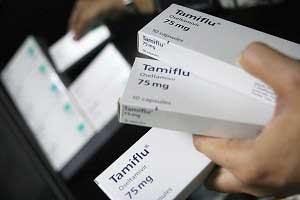Do not rely too much on Tamiflu
The over-reliance on Tamiflu in the fight against bird flu could have unpredictable consequences, warning Italian scientists.

Drugs Tamiflu (Photo: News.Yahoo)
In the British journal Lancet, experts say there is no evidence that the current top-line anti-influenza drug is completely effective against the H5N1 virus and may be rarely used once the mutant virus becomes a strain. pandemic.
Tamiflu and Relenza only work to reduce flu symptoms and shorten the duration of illness. They are not a radical cure. However, it is still believed that these two drugs play an important role in repelling pandemics when the mutant H5N1 virus becomes a human-to-human strain. By using them at the place where the new virus appears, it is believed that it can stop or at least slow down the spread of the virus. With this belief, the governments of the racing countries store them, especially Tamiflu.
However, the Cochrane Vaccines (Italy) warns against overreacting to this preventive measure. It is only useful when used in parallel with simple preventive measures such as isolating patients, encouraging the community to wear masks and frequent hand washing.
The author group, led by Dr. Tom Jefferson, synthesized a series of previous studies on Tamiflu and Relenza, along with two older products, amantadine and rimantidine, the goal of evaluating effectiveness and safety. all.
The results showed that Tamiflu and Relenza actually reduced symptoms and shortened the duration of illness if used within 48 hours after infection. They also help prevent pneumonia and sore throat - flu complications.
However, no drug is effective in asymptomatic people, despite the virus. In addition, Tamiflu does not completely relieve symptoms of runny nose. Meanwhile, the World Health Organization (WHO) confirmed that when the nasal discharge and sneezing, H5N1 patients secrete 10 times more virus than patients with regular flu, so the risk of transmission higher.
The Jefferson team also investigated the effect of Tamiflu on three strains of bird flu, H5N1, H7N7 and H7N3. As a result, Tamiflu did not reduce the death rate of the H5N1 virus . Another potential risk is that Tamiflu resistance is relatively high (16%) in cases in Japan and Vietnam.
Meanwhile, western Asia has become a new attraction for disease. Iran and WHO are investigating whether bird flu killed a 15-year-old girl. Iran is a stopover of migratory birds from Turkey. Experts warn it will be difficult to control the disease because the country lacks everything. In neighboring Turkey, at least 21 people have been infected with H5N1. China has just announced the sixth bird flu death.
My Linh (according to AFP)
- Flu is usually good for Tamiflu
- Tamiflu does not work against the flu?
- China has the same drug Tamiflu
- Detecting variants of Tamiflu-resistant influenza A / H1N1 virus
- Detection of Tamiflu resistant virus
- Discovering new compounds better than influenza A / H1N1 virus than Tamiflu
- Tamiflu fever medicine
- Tamiflu for local medicine
- Japan reviewed Tamiflu-related deaths
- FDA investigates the side effects of Tamiflu
- Many agencies seek to buy Tamiflu
- 'Tamiflu resistance is very normal'
 March 2012: Launching H5N1 vaccine for poultry
March 2012: Launching H5N1 vaccine for poultry Experts comment on the mysterious gradual disappearance of the Delta variant in Japan
Experts comment on the mysterious gradual disappearance of the Delta variant in Japan Danger of the two Delta . branch variants
Danger of the two Delta . branch variants 2020 pandemic flu attack humans?
2020 pandemic flu attack humans?